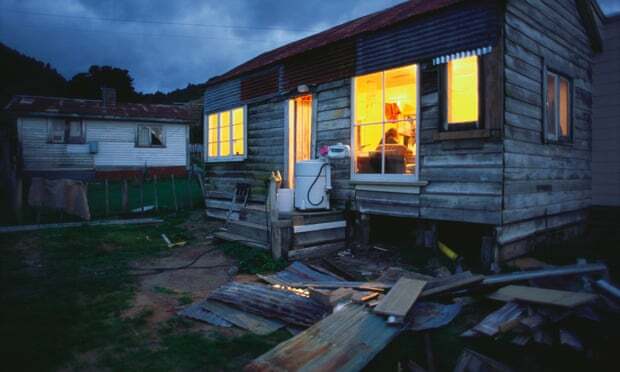A 30% rise in people waiting for state housing in Northland region fuels country’s ‘desperate’ shortage in affordable homes
New Zealand government MPs have heard that the housing situation in Northland has become so desperate some families are living in the woods, in huts built in the forks of trees.
Northland is one of the most deprived regions of the country, with a median income of NZ$23,400. The population is also 32% Māori – double that of the rest of the country.
At a housing hui (meeting) held in Whangarei on Thursday, the Māori affairs minister, Nanaia Mahuta, who is also associate minister of housing, was told by local housing advocates that the shortage of affordable housing had become “desperate” in the north island region, with families forced to live in trees, self-built huts, old vehicles, lean-tos, derelict houses and carports.
Mahuta acknowledged the housing situation had become a “crisis”, especially for Māori, saying there had been a 30% increase in Northland for those on the waiting list for a state house in the past year.
Having a home was a pillar of whanau (family) prosperity and wellbeing, the minister said in her address to the hui.
“Many people in Northland are facing significant housing challenges – from people who are homeless, people living in their cars or in the outdoors – through to people who do have a house but it’s cold and damp or overcrowded, through to young families struggling to find a place to rent or to save a deposit,” Mahuta said.
“It has taken us a long time to get to the point we are at with Māori housing. It will not be a short journey to change the course of the past.”
But while the government says building housing in Northland is a “priority”, locals on the ground feel they are being ignored.
“Sometimes I feel like I’m just one social worker on the end of the phone with many others trying to get through a gateway that’s impossible,” Te Hā Oranga social worker Christiane Rudolph-Anania told the hui, as reported by RNZ. “And when I say gateway, I’m talking Housing New Zealand, MSD [ministry of social development]. There seems to be no empathy.”
Northland is New Zealand’s fastest growing province. Contributing to last year’s 2.3% population growth were Aucklanders fleeing unaffordable housing in the country’s biggest city, and instead choosing to buy in Northland and commute to the city.
This meant that for Northland locals, buying or even renting a home was becoming harder by the month.
Towns such as Kawakawa and Kaikohe, once neglected rural enclaves tainted by long associations with poverty and gangs, are now experiencing significant property booms, putting homes out of reach for Māori families who have lived in the area for generations.
Last year Kawakawa’s median house price rose 39%, peaking at NZ$280,000, when it was just $127,000 three years ago.
Māori elders say many young Māori are also returning to the region, adding further pressure to housing stock, after becoming disillusioned with how tough life is becoming in New Zealand cities.
Northland’s population boom is having a knock-on effect in other areas too, with many new residents having to wait a month or more for a GP appointment, and school enrolments up 10%.
Source: theguardian




